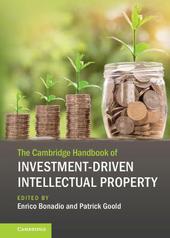
|
The Cambridge Handbook of Investment-Driven Intellectual Property
Hardback
Main Details
| Title |
The Cambridge Handbook of Investment-Driven Intellectual Property
|
| Authors and Contributors |
Edited by Enrico Bonadio
|
|
Edited by Patrick Goold
|
| Series | Cambridge Law Handbooks |
|---|
| Physical Properties |
|
| ISBN/Barcode |
9781108839198
|
| Classifications | Dewey:346.048 |
|---|
| Audience | |
|---|
| Illustrations |
Worked examples or Exercises
|
|
Publishing Details |
| Publisher |
Cambridge University Press
|
| Imprint |
Cambridge University Press
|
| NZ Release Date |
31 March 2023 |
| Publication Country |
United Kingdom
|
Description
This handbook challenges the conventional wisdom that intellectual property is the law of creativity. Traditionally, IP has been instrumental for protecting creations of the mind, with only inventors of original works enjoying exclusive rights. Related, sui generis, and quasi-IP rights, which protect monetary investments and efforts rather than originality and inventiveness, were considered exceptions to the general principles of IP. But increasingly, IP rights are being granted to safeguard corporate investments. This handbook brings together an international roster of contributors to explore this emerging trend. Why are investments the primary driver of legal protection, and often the main requirement to obtain it? Who benefits from such new forms of protection? What should the scope of these new rights be? And are they desirable in the first place? In doing so, the volume is the first to highlight and systematically critique the move from 'intellectual' to 'investment' property.
Author Biography
Enrico Bonadio is a Reader in Law at City, University of London. He researches, teaches and advises in the area of intellectual property. Patrick Goold is a Senior Lecturer in Law at City, University of London. He is a legal philosopher with interests in IP, property, and private law theory.
Reviews'This Handbook maps the exploding universe of intellectual property - with the expansion of the galaxies of copyright law, trade mark law, and patent law, and the creation of a constellation of new sui generis forms of intellectual property. This Handbook charts the investor-driven nature of this enlargement of intellectual property - looking at how investors have pushed back the boundaries of subject matter, with batteries of test cases and self-interested law reform. This Handbook raises doubts about the predominance of investment as a dominant philosophical underpinning of intellectual property. This Handbook questions whether this investor-led growth of case law and law reform in intellectual property is justified. This Handbook worries whether Wall Street should really dictate the future shape and boundaries of intellectual property law and policy.' Matthew Rimmer, Professor in Intellectual Property and Innovation Law at the Faculty of Business and Law, at the Queensland University of Technology (QUT) 'This is a stimulating collection of essays that explores the investment-driven nature of much of IP law. A diverse array of experts examine IP, quasi-IP, related and sui generis rights, ranging from software protection, test data exclusivity, and database rights to sound recordings, the press publishers' right and designs protection, and to well-known trade marks, ambush marketing, and GIs. In so doing, the book sheds light on the shaky foundations of the investment justification for IP protection.' Tanya Aplin, Professor of Intellectual Property Law, King's College London, and co-author of Global Mandatory Fair Use: The Nature and Scope of the Right to Quote Copyright Works 'While the conventional narrative on IP is that it promotes creation, this book demonstrates how IP has shifted to protect investment even of non-creative products. Scholars and policy makers will benefit from original contributions that enlighten on what has been one of the key driving forces of the expansion of IP for the twenty-first century.' Carlos Maria Correa, Executive Director, The South Centre, Geneva 'From protecting electronic databases and pharmaceutical test data to granting new rights to broadcasting organisations and press publishers, intellectual property law has become increasingly investment-driven. This timely and refreshing volume pushes us to think deeper about whether the law has steered away from its original purpose and traditional contours, or whether it has simply responded to the needs and challenges of the twenty-first century. A well-curated and provocative collection on a very important debate!' Peter K. Yu, Regents Professor of Law and Communication, Texas A&M University
|